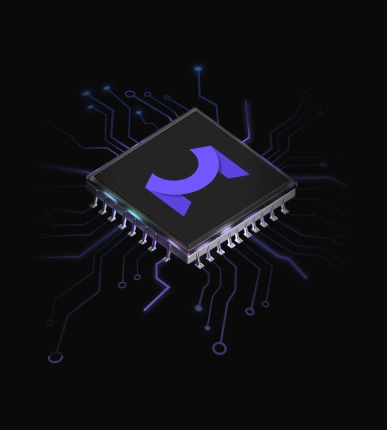MeshLib is built with speed and efficiency in mind, making it the go-to solution for developers looking to integrate high-performance 3D data processing into their applications. Whether you’re working in dental, manufacturing, or 3D printing, MeshLib’s powerful C++ algorithms and flexible API options deliver the performance and reliability you need to innovate and grow your business.

Developing a dental application that can handle intricate 3D models of teeth and prosthetics with precision, speed, and efficiency—essential for creating custom dental devices like crowns, bridges, and implants.

Instantly merge or subtract complex shapes with unparalleled precision. MeshLib's Boolean algorithms outperform traditional solutions by handling complex geometries without delays, ensuring seamless integration of dental implants with existing teeth models.
Create exact spacing between dental components, critical for prosthetic fit and patient comfort. MeshLib’s Offset algorithm calculates the necessary adjustments in milliseconds, making it ideal for applications that require real-time feedback.
Developing patient-specific medical applications requires highly precise 3D models generated from CT or MRI scans. These models must accurately reflect unique anatomical structures while being free from defects like holes or self-intersections. Additionally, creating optimized, patient-specific designs for implants, prosthetics, or surgical guides demands robust mesh processing techniques that ensure watertight geometry, preserve essential anatomical features, and support compatibility with 3D printing technologies and surgical planning software.

is crucial for turning raw medical data into accurate 3D models that reflect the unique anatomical structures of each patient. This precision is essential for applications such as custom implants, surgical guides, and prosthetics.
Ensures that the models generated from medical scans are defect-free and ready for manufacturing. This is particularly important when producing 3D-printed parts, where even minor defects can lead to production issues and compromised quality.
Enable advanced modeling capabilities, such as creating complex shapes that fit perfectly with existing anatomical structures. This is vital for designing implants or prosthetics that require custom fits.
By using MeshLib, developers can create highly accurate, defect-free 3D models tailored to individual patients. These features lead to the production of custom implants, surgical guides, and prosthetics that fit precisely and function reliably, improving patient outcomes while streamlining the development and manufacturing process.
Optimizing raw 3D scans for printing can be time-consuming and prone to errors, leading to delays and increased costs. Traditional software often struggles with processing complex models quickly and accurately.

MeshLib SDK accelerates and simplifies the process of preparing 3D models for printing:
Detect and repair common mesh issues such as holes, overlapping faces, and degenerate triangles in milliseconds. This ensures that models are watertight and print-ready without manual intervention.
Reduce the complexity of models while preserving critical features, and apply precise offsets to ensure the correct thickness for 3D printing. MeshLib’s algorithms execute these operations almost instantly, preventing bottlenecks in the workflow.
3D printing software powered by MeshLib can handle complex model preparation faster than ever before, enabling users to achieve high-quality, accurate prints with less effort. This leads to shorter production cycles, reduced costs, and a competitive edge in the market.
CT scanners capture vast volumes of data, which require high-resolution reconstructions and precise mesh generation. Without the right tools, transforming CT data into usable 3D models can be slow and prone to error, complicating applications in healthcare, industrial inspection, and research.

MeshLib SDK offers robust tools tailored to handle large CT data with efficiency and precision:
Enables high-quality reconstruction of volumetric data, transforming slices into dense, detailed 3D models for further analysis.
Adjusts the thresholding of scanned data to isolate specific anatomical structures or material densities, perfect for customized segmentation.
Converts CT volumes into accurate 3D mesh models that capture detailed anatomical or material features.
Developers utilizing MeshLib can create CT scanner software that’s precise, fast, and reliable, empowering healthcare and industrial users to process complex scans with accuracy, reduce operational delays, and deliver better outcomes.
Processing LiDAR data requires cleaning, aligning, and converting point clouds into useful 3D models. Traditional software can struggle with registration, error correction, and data volume, creating challenges for applications in surveying, urban planning, and autonomous navigation.

MeshLib SDK is equipped with specialized algorithms to handle massive LiDAR datasets effectively:
Aligns multiple point clouds into a cohesive, unified model, streamlining the processing of large, complex scans.
Removes outliers and noise, ensuring data clarity and precision.
Reduces point density for efficiency and converts point clouds into meshes, providing a structured 3D representation.
Why MeshLib is the Solution: MeshLib's optimized toolkit allows real-time processing of large point clouds, maintaining accuracy and stability across varied terrains and environments. With rapid registration, cleanup, and triangulation capabilities, MeshLib is ideal for developers creating surveying, mapping, and autonomous navigation applications that demand reliable, high-speed performance.
LiDAR applications built with MeshLib’s SDK are efficient and robust, allowing users to quickly clean, align, and convert raw LiDAR data into valuable 3D models. This enables faster decision-making, reduces data processing times, and offers significant value in fields such as geospatial analysis and environmental monitoring.
MeshLib SDK offers multiple ways to dive in — from live technical demos to full application trials and hands-on SDK access. No complicated setups or hidden steps. Just the tools you need to start building smarter, faster, and better.
